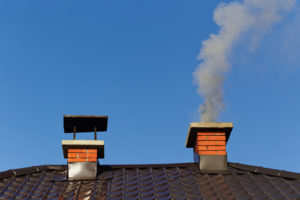How to Prevent Chimney Odors
The two main causes of foul chimney odors are a water leak or a draft problem. Both problems are 100 percent preventable, so it’s important to properly use and maintain your fireplace and chimney to avoid such a headache. Chimney odors are generally noticed in the spring, when fireplaces are used sparingly, or done for the season. Spring offers all the ingredients needed to produce foul odors: moisture, soot, and negative air pressure.
Moisture and Your Stinky Chimney
When moisture mingles with soot and creosote, it can create a distinct foul odor. The smell can range from a smoked meat scent to a musty or campfire smell. All of these smells usually mean there is moisture in the chimney, but this can be from a chimney leak or simple humidity.
- Have your chimney inspected annually.
You can catch a leak before it becomes a serious problem by scheduling an annual CSIA chimney inspection with a certified chimney sweep. Only a professional can detect minor damage that can allow water into your chimney system. Water doesn’t only create nasty odors but can also deteriorate a masonry chimney rapidly. - Keep the chimney clean.
It’s not just a chimney leak that allows water into your chimney system. The natural occurrence of summertime humidity can cause foul odors in the chimney as well. The only way to prevent this is to keep the chimney clean by scheduling regular chimney sweeps. Chief Chimney offers a thorough cleaning at an affordable price because we know that it’s the best way to keep your family safe and comfortable—and that means preventing foul odors.
Negative Pressure and Your Stinky Chimney
Your chimney uses the naturally-occurring drafts in your home to vent your fireplace. When the fireplace isn’t in use, there is no warm air present to rise up the chimney. Instead there is negative air pressure in the house, which creates a downdraft in the chimney, pulling air from the stinky chimney into the house.
- Crack a window or install a fan.
Cracking a window in another part of the house or installing a small fan can pull air from the outside of the house, forcing an updraft through the chimney, and keeping the smell inside the chimney. - Use the damper to prevent a downdraft.
By closing the damper at the throat of your chimney, you should prevent a downdraft from bringing any air into the house via the chimney. Installing a top-sealing damper is even more effective because it has an air tight rubber seal. The top-sealing damper seals the chimney from the top, so it doesn’t only stop the draft completely, but also prevents humidity from entering the chimney.
Before you settle for a smelly chimney, call the experts who know chimneys! At Chief Chimney we clean, inspect, waterproof, and repair chimneys year-round. Call today at 631-863-2460 or request an appointment online.
